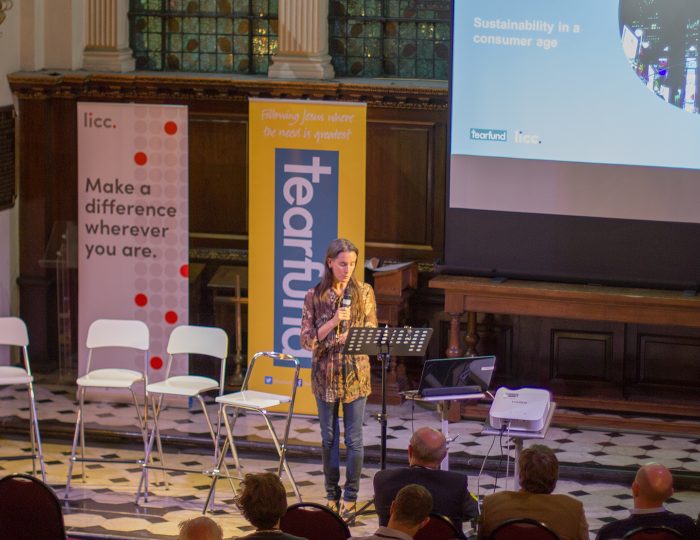‘It was a like a second conversion, the scales fell off my eyes.’
I’m sat in the Tearfund offices, sipping a cup of tea and talking to Ruth Valerio about discipleship, poverty, and sustainability. Ruth, Global Advocacy and Influencing Director at Tearfund and author of L is for Lifestyle and Just Living, is describing a crucial moment in her life. The moment she realised that being concerned for all that God has made – not only humans, but the earth as well – really is a key part of what it means to be a Christian and a follower of Jesus.
Reading theology at university, she came across a book called Whose Earth? It was a read which, through its simple explanation of what the Bible has to say about environmental issues, changed her world.
As she began to learn more about the place of justice within the Christian faith and started campaigning for change within business and government, she says, she realised that ‘all of that was really important but if I wasn’t living it out in my own life, I couldn’t be pushing governments or businesses to change’.
Whether it’s changing how much she flies, considering the food she eats, or switching to an electric car, sustainable living forms a part of Ruth’s everyday life and discipleship. ‘But before all of that’, she points out, ‘it’s about reducing how much we consume in the first place.’ This is some of what last week’s Tearfund and LICC event Sustainability in a Consumer Age touched on.
‘We don’t realise the impact that consumerism has on us and the challenges it presents to us as Christians’, she says, acknowledging that it’s not just about environmental concerns, but about challenges around our time, our lifestyles, and how ‘crowded’ our lives feel.
It also, she suggests, is about individualism: ‘consumerism teaches us to focus on ourselves rather than reach out and build community.’ Therein lies another challenge – ‘there’s a call for us as a church to stand up and live differently. We like to think of ourselves as being counter-cultural but when it comes to our consumer society I think we’re the same as everybody else.’
So, where does this tie into faith and whole-life discipleship?
Living sustainably and consuming less comes from deeply rooted theological thinking, and Ruth is passionate about the Biblical basis for environmental care. Her motivation comes from Genesis 1:31, where God looks at all that he had made and said ‘it is very good’.
‘This is a world that God values and loves deeply’, she continues, ‘Colossians 1 tells us that this world was made by Jesus and for Jesus and through Jesus, almost like this world is a gift from the Father to the Son.’
Quite simply, Ruth poses a question: ‘if this world is so valued so deeply by God then, as God’s children, as those who love God, why on earth would we be happy to trash something that’s so valuable to him?’
With that knowledge, it makes total sense that living sustainably and environmental care should form part of our worship and discipleship. ‘It’s a part of how I follow Jesus and worship him alongside all the other things that you would think about when it comes to discipleship and worship’.
One example of the rhythms of discipleship this creates in Ruth’s life is the chore of washing the muddy vegetables. Something which she originally hated has now become a time for spiritual reflection: ‘as I wash them, I take the time to reflect on the soil that they have come from, the people who have grown them. I take the time to thank God that they have come from the land, and for the rain that has watered them.’
Finally, as our time together draws to a close, I ask Ruth for her top three tips for living sustainably:
- Start with your diet – our high meat diet is one of the most environmentally damaging things that we do. Move towards a much more vegetable and grain based diet. Consider eating meat just once a week, for example.
- Flying – even just one flight knocks out any other good we might have already done. Why not consider abstaining from flying within the UK, and try as far as possible not to fly within Europe either? Overall, we must fly much less than we currently do.
- Switch your energy supplier to renewable or sustainable energy. This takes five minutes, and doesn’t need to cost any extra. Ruth recommends Ecotricity or Green Energy.


Author
Nell Goddard